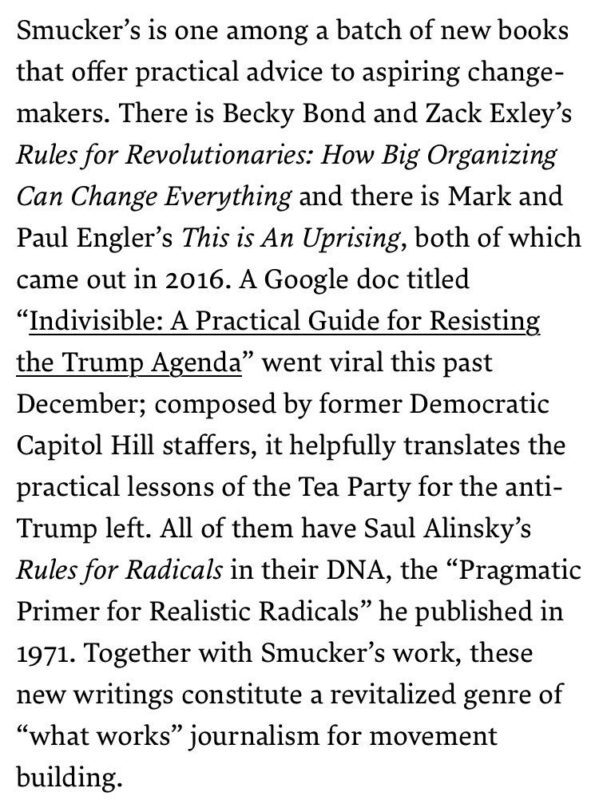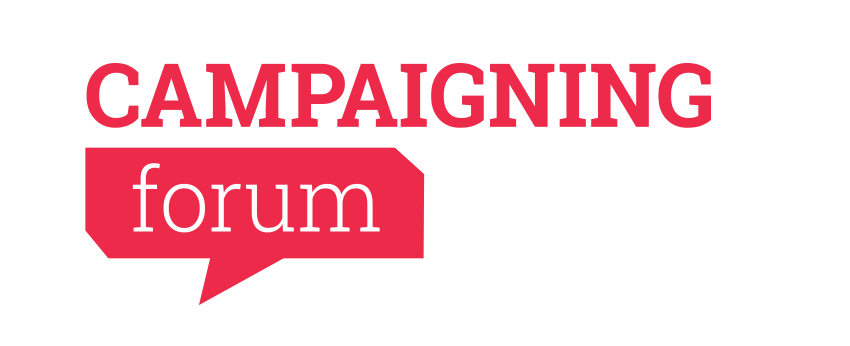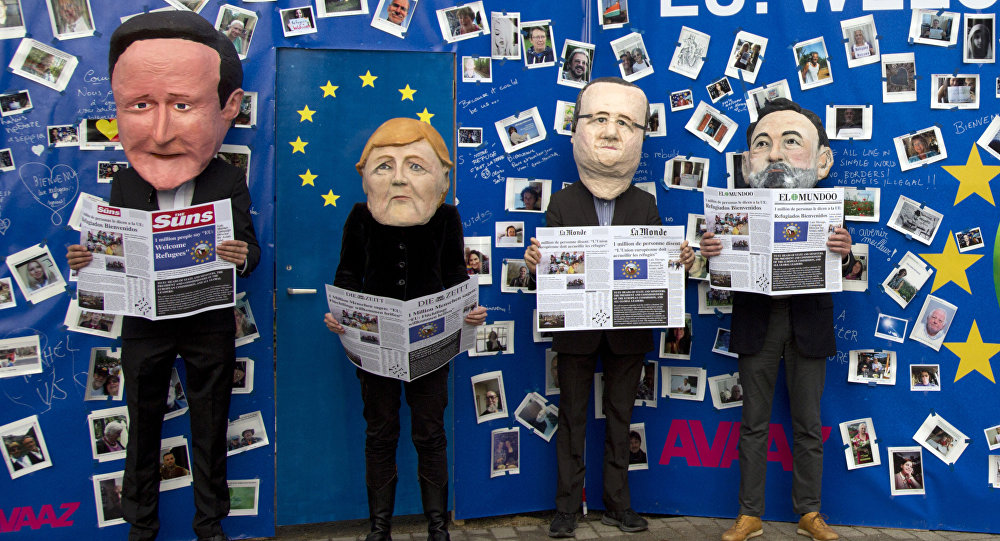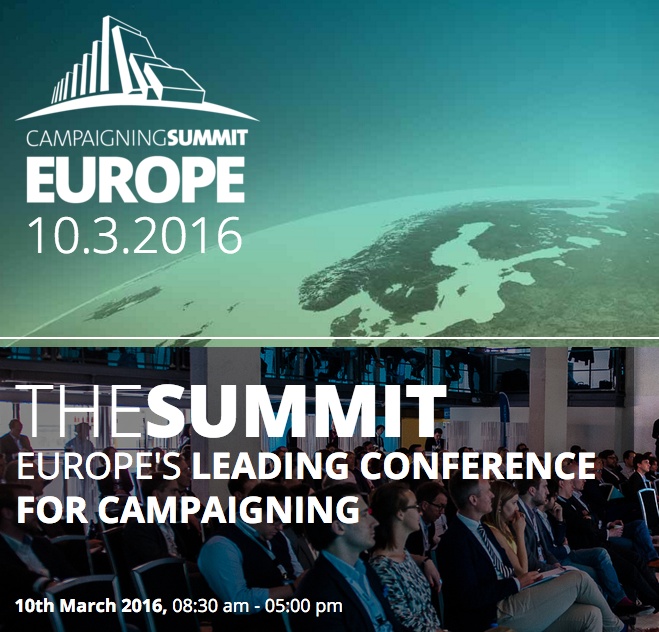Summer is here, so I’m going to take a brief break from blogging during August. I’ll be back in September, but if you’re looking for some great content to keep you thinking over the coming month, here are some recommendations of some ace books, blogs and podcasts to keep you busy.
Books I’ve enjoyed;
1. Hegemony How-to: A Roadmap for Radicals – Jonathan Smucker’s honest look at why movements too often fail, and what we can do to avoid being closed groups. One of those books you find yourself nodding at as you read + highlighting sections of it!
2. The Myth Gap: What Happens When Evidence and Arguments Aren’t Enough – Alex Evans has written a really enjoyable read about the need for us to rediscover the power of stories and myths to inspire change.
3. Analytic Activism – David Karpf looks inside Move On, Avaaz and other online campaign platforms approach. It’s one of the most accessible academic books I’ve read, and full of useful learning. Good podcast with David here if you’ve not got time to read the book.
4. Radical Candor – I took a while to get into this, but have been recommending Kim Scott’s book on how to give and receive feedback as a manager, but found it really helpful for anyone managing a team.
5. The Talent Lab: The secret to finding, creating and sustaining success – a really interesting look into the drivers behind the success of the GB Olympic team. As I suggested in my post on what we can learn from Chris Froome there are lots of lessons for campaigners to reflect upon from winners.
Books I’ve had recommended to me which I’ll be reading in the coming months;
1. This Is An Uprising: How Nonviolent Revolt Is Shaping the Twenty-First Century by Mark + Paul Engler
2. Hope in the Dark: Untold Histories, Wild Possibilities by Rebecca Solnit
3. How to Resist by Matthew Bolton
4. Carpe Diem Regained by Roman Krznaric
5. Get Up! Stand Up!: Personal journeys towards social justice by Mark Heywood
6. No is Not Enough by Naomi Klein
Some long reads I’d recommend;
1. Barack Obama on how to bring about change.
2. Stop Raising Awareness Already
3. Protest and persist: why giving up hope is not an option
If you’re not the read type then here are some ace podcasts to add to this list;
1. Advocacy Iceberg
2. Candidate Confidential
3. Freakonomics Radio
And if you’re able to get to London, then here is an exhibition to check out;
1. People Power: Fighting for Peace at the Imperial War Museum
Finally, you need to add the following blogs to your reading list;
1. Analytical Activism by Alice Fuller
2. The Good Campaigner by Emily Armistead
3. The Social Change Agency
4. Jim Coe
Category: links
Packing for the journey ahead – links from Campaigning Forum talk
I’m really excited to be in Oxford today, speaking at the Campaigning Forum (formerly the eCampaigning Forum), the annual gathering of campaigners from across UK and beyond. I’m going be speaking on ‘Packing for the journey ahead – 7 essentials campaigners need to have to journey into the future’.
In the talk, I’m planning on looking back at the last year, and look ahead at what are the tools, tactics and approaches that as campaigners we need to pack for the journey ahead and ask how do we ensure that our campaigns can continue to be relevant in 2017 and beyond. I’m going to reflect on how we prepare in a VUCA (volatile, uncertain, complex and ambiguous) world.
Below I’ve posted links to some of the articles, campaigns, studies and resources that I’ve been reflecting on as I’ve been preparing.
On my packing list are;
- Friends – if we’re going to adventure we need to build communities;
- Purpose Driven Campaigning guide drawing on the lessons from the book Purpose Driven Church is here.
- More on the work of Zaid Munson on the pro-life movement in the US is here.
- I’d also recommend anything by Hahrie Han on how we organise, and this excellent resource from Mobilisation Lab on How Today’s Volunteers Build Power for Movements and NGOs comes recommended.
- This is the post I’ve written on what parkrun has taught me about building campaign communities.
- Daniel Hunter on building a resilient culture in hard times.
- The NetChange report can be downloaded from here (and a summary is here)
- Binoculars – To observe, learn and understand those who oppose us
- The full Sun Tzu quote is “If you know the enemy and know yourself, you need not fear the result of a hundred battles. If you know yourself but not the enemy, for every victory gained you will also suffer a defeat. If you know neither the enemy nor yourself, you will succumb in every battle.”
- My blog on learning from Trump and Brexit is here.
- On the Tea Party, I’d recommend a read of Boiling Mad – Inside the Tea Party and Tea Party and the remaking of Republican Conservatism. This is the Theda Skocpol research on the climate movement.
- On Brexit campaign, then Dominic Cumming’s blogs are really interesting.
- I’d also really recommend this on the Bernie campaign and this is the Indivisible campaign.
- And I’m sharing this quote again as I think it’s always relevant!
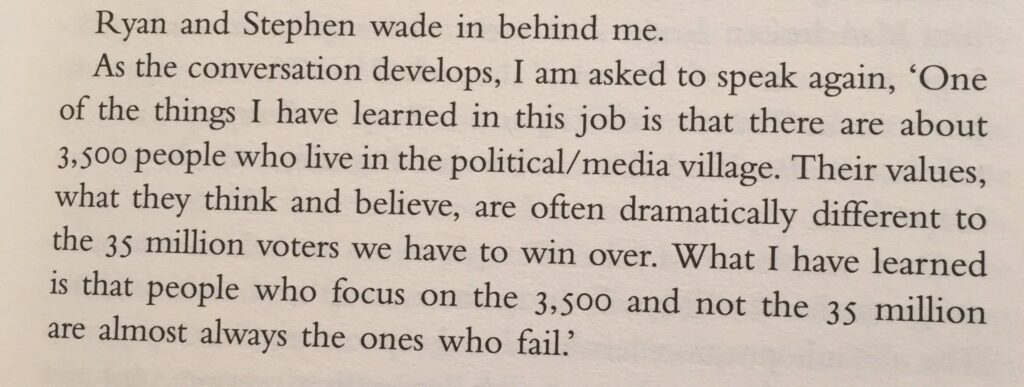
- Enamel Mug – because we need to tell stories not just rely on facts.
- Duncan Exley on why we need good stories as well as good facts.
- This is the book Made to Stick.
- I’d also recommend the Myth Gap by Alex Evans (short presentation here)
- A useful read on why facts don’t resonate anymore, and why we get ‘raising awareness’ wrong.
- Multi-tool – ”A tactic that drags on too long becomes a drag” Saul Alinsky
- The research I referenced is covered in more detail in this Washington Post article.
- Micah White has some interesting things to say on future campaigning in The End of Protest.
- I mentioned Spendrise, Client Earth and Share Action as interesting examples employing different approaches.
- This has some more on Leaktavism. Hopefully, Craftivism doesn’t need introducing to anyone at ECF2017!
- Torch – time to shine a light on our assumptions, and bring our mistakes into the light.
- Some thoughts on embracing failure here.
- I’ve been enjoying Black Box Thinking about how we challenge and also recommend the Silo Effect.
- Compass – We will still need leaders, but new models of leadership
- My blog on leadership in campaigning is here and a few more links here following a recent Sheila McKechnie Foundation ‘Masterclass’.
- This is the paper on leadership in the age of complexity by Margaret Wheatley
- I’d also recommend this on leadership for charity campaigners by Karl at NCVO.
- Journal – To chart the progress that we’ve already made and are making
- I’m sure many have already read Rebecca Solnit on Protest and persist: why giving up hope is not an option but it’s a really important read.
- Here are a few campaigns that have inspired me in the last 12 months.
- And a few thoughts from one of my favourite campaign films, Selma.
And finally, a reminder;
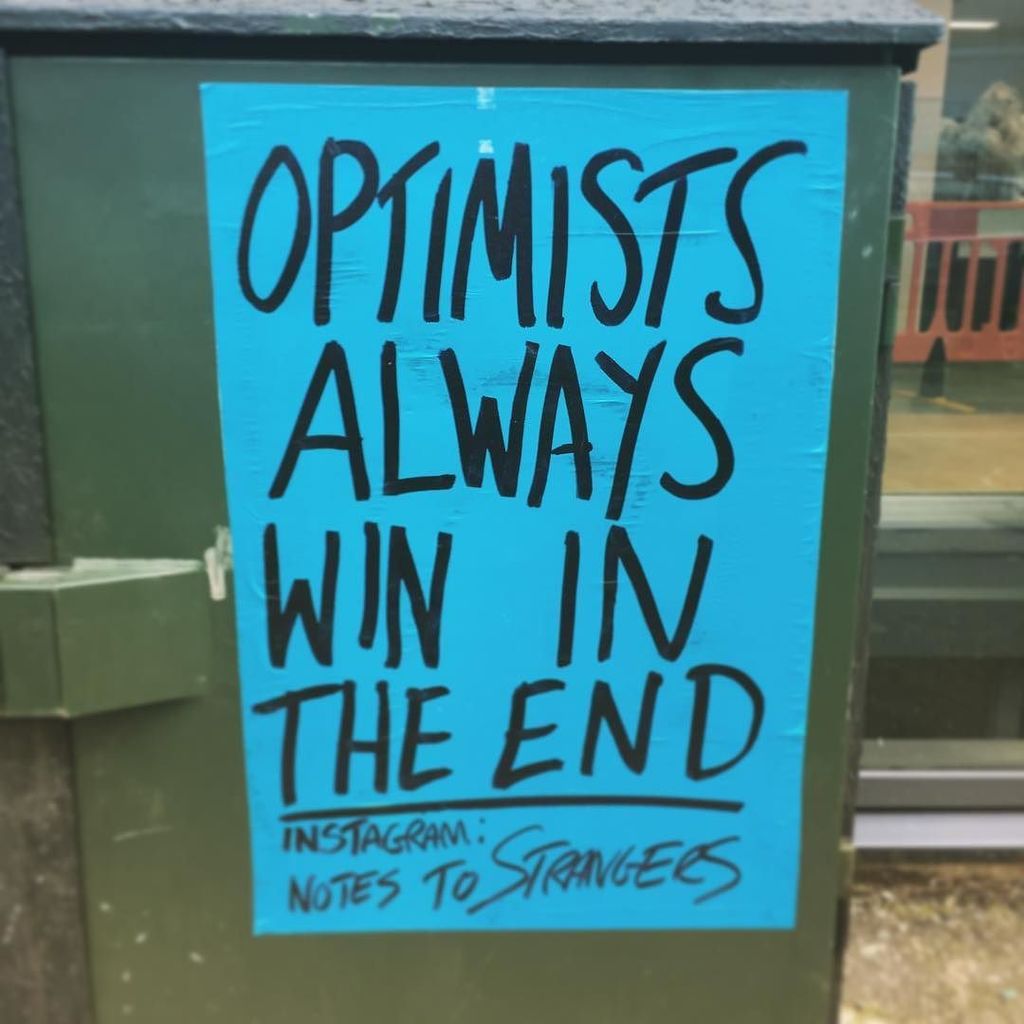
Disagree with the result – but you can learn from Trump and Vote Leave campaigns
2016 hasn’t been a great year (and at the end of it I’d encourage everyone to read this about how to make sure we’re looking after ourselves as campaigners) – but I’m convinced that there is learning for campaigners to take from any campaign – even if you passionately disagree with the outcome.
Let’s start with Trump
- Don’t underestimate what those on the ground are telling you – in a world of insight and data it’s easy to trust the model, but the unexpected victory of Donald Trump in November has led some to suggests that the Clinton ignored those on the ground who saw the threat coming – so much so they might have actually been mobilising people to vote for ‘The Donald’
- Everyone get’s excited about Twitter but Facebook is where it’s at – we might have all become obsessed with Trump’s tweets, but behind that Donald Trump was building a Facebook operation to target those who he needed to mobilise, but no one else could see those posts. It was the same in Australia, where the unseen Facebook campaign helped swing the election, or Brexit where the Leave campaign ‘served about one billion targeted digital adverts, mostly via Facebook’.
- Get creative about how you acquire the data you need – For Clinton it was via concerts to collect data to help mobilise key voter groups, for the Leave Campaign it was a competition to win £50m if you could predict the results of the European Football Championships. Both might be seen as gimmicks but they helped to collect data the campaigns needed.
- But if you are going to respond with protest have a clear theory of change – as this article there is both a science and an art behind successful protests. Want to get the low-down on what makes a protest work then these 10 social science insights are a good place to start
Don’t overlook what Bernie Sanders built
While he might have lost the Democrat Primary his organising model is likely to echo into future elections (this is a good summary and you should 100% read this).
- Make the most of armchair volunteers – Bernie didn’t just ask people to get involved in contacting voters, but his distributed organising model made the most of armchair volunteers – individuals who are happy to spend hours at home inputting data or staffing virtual help desks.
- Build a model that can scale – Sanders started as the underdog, he didn’t have lots of money or people so outside the first few states he had to build a distributed model that could scale. The principles can be adapted by other campaigning organisations as this Net Change report shows.
- Harness the power of mobile – If 2008 was the email election and 2012 was the Twitter election, I’m not sure what 2016 should be called, but the way that Bernie used mobile to engage with voters might be one of the lasting legacies.
Remember Brexit?
I wrote this shortly after the vote in June. I think lots of the insight still stands but 6 months later there are an abundance of people writing from inside the campaigns on what worked and didn’t work.
- Focus beyond the Westminster Bubble – I really enjoyed Unleashing Demons by former No 10 Communications chief Sir Craig Oliver. Although he was on the losing side this insight seems pertinent to all campaigners;

- Message discipline wins – Like it or not, but Vote Leave focused on a tight message about take back control, with the now dodgy £350m statistic at the heart of it. As Tom Waterhouse who worked on the Leave campaign writes they managed to get their message to stick in a way that the Remain campaign didn’t, and while the Remain campaign tried to focus on myth-busting, Jon Quinn suggests it’s an increasingly ineffective tool.
- Street stalls don’t win you elections – while they can be good for visibility, the Leave campaign focused on building an impressive operation to make sure they were targeting the right people rather than high profile but ultimately ineffective approaches. From gathering emails from those who fancied winning £50m from predicting the election, to building their own technology to gather all the data they were collecting, to targeted mailings. As a result of testing, Leave knew who it needed to mobilise on June 23rd.
If you want more on the Referendum here are good insights from the Leave and Remain sides.
There is hope in unusual places – I’ve already shared learning from the Australian election, but this story of how Get Up focused it’s resources to impact where it really mattered.
But finally, let’s not forget that US Elections lead to some of the best campaign videos – this is one of my favourites.
“You want to give me a good send-off? Go vote!” —@POTUS: https://t.co/tTgeqy51PU pic.twitter.com/ESQkLV2yaJ
— Hillary Clinton (@HillaryClinton) October 12, 2016
Mobilising for Impact – links from my talk at The Campaigning Summit
Today I’m excited to be speaking at the Campaigning Summit in Vienna – it’s a gathering of over 300 campaigning professionals from across Europe (check out the amazing talks from previous Summits on video).
I’m going to be speaking on ‘Lessons I’ve learnt about how to mobilise for impact’
I’m going to be drawing on some of the lessons I’ve learnt from working on global poverty issues for the last 10 years or so. I’ve only got 20 minutes to fit a lot in, so I’m posting the key points and useful links to further resources.
Hopefully they’re useful to both those at the Summit and those reading the blog.
1 – Ask do I need to mobilise? It’s a question that we don’t ask enough. I explore some more key questions we should be asking here.
2. Build a politically diverse coalition – this is a good resource which looks at some of the different models that have worked. I’ve also written on how to make campaigning in coalition work here.
3. Nurture your activists – find out more about the work of Hahrie Han here and here. My friend Natasha Adams has written more here, and I contributed to a series of articles based on the book here. The table I shared in my presentation is below, taken from this blog by Jim Coe (who is also the host of an awesome advocacy podcast).
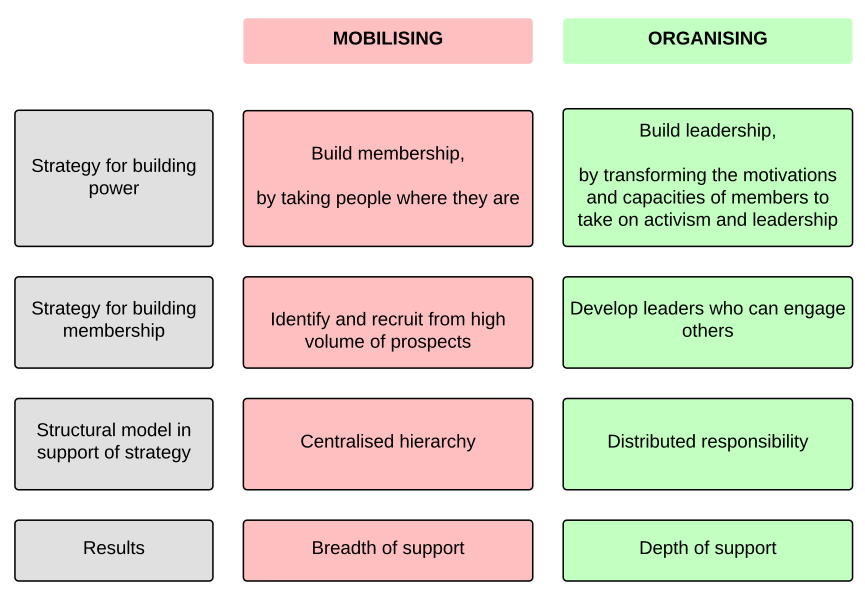
4. Focus on moments but beware of the cliff! – some tips for avoiding the cliff!
5. Learn from others – This is the brilliant Purpose Drive Campaign overview I mentioned (and more here). On learning from Bernie Sanders I enjoyed this and this.
6. Say Thank You and Celebrate – my learning from the Turn Up Save Lives campaign and some reflections on Make Poverty History.
And finally;
- Do follow me on Twitter
- Subscribe to get my latest post by email here.
- If I can speak at a event or conference you’re running, get in touch.
Are you signed up?
If you’re not already subscribed to these excellent updates on campaigning, I’d encourage you to do so now;
1 – NCVO Campaigning and Influence – a good monthly round-up of news, views and training opportunities.
2 – eCampaigning Forum – a busy list of over 100+ eCampaigners from around the world.
3 – Sheila McKechnie Foundation e-bulletin – a monthly newsletter promoting the work of the Foundation with useful links to the foundations blogs.
4 – MobLab Dispatches – excellent learning from the Greenpeace powered Mobilisation Lab every three weeks. A really good read.
5 – New Organizing Institute Tip of the Day – Simply brilliant.
Finally, if you’ve not already subscribed to this blog, why not have new posts delivered direct to you inbox by signing up using the box on the right!
Five for Friday…13th July
Here we go with this weeks ‘Five for Friday’. These are 5 great articles on campaigning that you should be reading this week.
1 – Not sure when to tweet? A useful visualisation of the best (and worst) times to do so.
2 – Grist asks Did 350.org’s Twitterstorm to stop fossil fuel subsidies work?
3 – What Jamie Oliver can teach activists.
4 – Mobilisation Lab shares its top ten tips for writing emails to change the world (and if you haven’t signed up for their brilliant monthly emails I’d encourage you to do so.)
5 – Some good reflections from NCVO on the recent charity tax campaign they ran. I wish more campaigns would run this bite-sized learning with others.
What would you add to the list?
While I've been away.
I’ve been in self-imposed blog exile for the last couple of months.
A combination of running a small part of an election campaign, two trips to the US for work, participation in an amazing action learning process hosted by the Common Cause team and a number of other commitments have meant that I haven’t been able to blog.
Here are a few things that caught my eye while I’ve been away;
 1. Avaaz 2.0 – The global campaigning movement has launched a platform for its own members to develop and run their own actions. It’s still in beta mode at the moment but I’m sure that will change in the coming months. Also Change.org has launched its own UK platform with some great coverage. I’ve written before about how I really like the model that Change.org uses providing campaign organisers to help increase the impact of online petitions created by members. I hope that both will be successful.
1. Avaaz 2.0 – The global campaigning movement has launched a platform for its own members to develop and run their own actions. It’s still in beta mode at the moment but I’m sure that will change in the coming months. Also Change.org has launched its own UK platform with some great coverage. I’ve written before about how I really like the model that Change.org uses providing campaign organisers to help increase the impact of online petitions created by members. I hope that both will be successful.
2. Right Angle – The platform aims to be ‘a grassroots community. We exist to stand up for ordinary families – Britain’s silent majority’ and is supported by a number of Conservative MPs. So far, they’ve not had the same impact that 38 Degrees had in their first few month, although they were able to generate over 100,000 people to join their Facebook campaign against cutting fuel duty, so it’ll be interesting to see how the grow over the summer.
3. Twitter – It’s been great to see organisations engage with twitter in more and more innovative ways, two particularly impressed me. The Twobby of Parliament by members of the Care and Support Alliance, and the development of this tool by ONE which allows users to send messages to David Cameron on food security.
 4. People’s Pledge – This sneaked under the radar , but I think the ability of an organisation to mobilise 14,000+ people in a constituency to vote for a local referendum on membership of the European Union is an impressive feat. With the introduction of the Localism bill, I wonder if we’re going to see more of this community level campaigning that leads to local ballots on issues.
4. People’s Pledge – This sneaked under the radar , but I think the ability of an organisation to mobilise 14,000+ people in a constituency to vote for a local referendum on membership of the European Union is an impressive feat. With the introduction of the Localism bill, I wonder if we’re going to see more of this community level campaigning that leads to local ballots on issues.
5. The next Make Poverty History – It was confirmed that development organisations are coming together to launch another ‘Make Poverty History’ style campaign in 2013. I’m sure this will be huge in the next 12 months, and I’m hoping that all those involved read this about lessons learnt and ensure that the next campaign is designed to avoid them.
6. KONY 2012 – I wrote before my blogging break about why the video had such a phenomenal response when it was first released, however the campaign wasn’t able to sustain the initial interest with the ‘Cover the Night’ event in late April failing to take off in the way they’d originally hoped.
7. US Election – Lots more great articles about different techniques and tools being employed in the campaign. I’d highly recommend every campaigner keeps an eye on the articles by Sasha Issenberg over at Slate, which I’ve found to be the most insightful into the approaches the campaigns are taking.
Life is returning to normality, so I plan to write some more on these topics and others in the coming weeks, as well as share the initial results I’m getting in government departments about the number of actions they’ve received in the last 12 months.
Five for Friday….KONY 2012 Special
 The Kony 2012 phenomenon is still going (and growing), it’s the officially the most viral video ever.
The Kony 2012 phenomenon is still going (and growing), it’s the officially the most viral video ever.
So this weeks ‘Five for Friday’ is dedicated to some great articles reflecting on KONY 2012 that you should be reading.
1. SocialFlow have done some brilliant work looking at how online networks helped to share the campaign and then the impact of tweeting by ‘culturemakers’, while Forbes looks at who’s watching the film. Answer – they’re 13 – 17 year old females watching it on their mobile phone.
2. Jason Mogus asks Why your non-profit won’t make a KONY 2012. It’s a very perceptive look at many of the blockages that more traditional NGOs would face if they wanted to repeat the success of KONY.
3. This is a brilliant deconstruction of why the film is so successful using lessons from persuasive techniques used by marketeers.
4. Both Weldon Kennedy and Daniel Solomon look at why the messaging and narrative of the film are so compelling. Lots of really useful lessons here for all communicators. The Mobilisation Lab also asks why the campaign hooks viewers in.
5. Ross Bailey shares his reflections and reminds us that Invisible Children didn’t get here overnight.
Five for Friday….17th February
Here we go with this weeks ‘Five for Friday’. These are 5 great articles on campaigning that you should be reading this week.
1 – Casper ter Kuile asks if the megaphone represents everything that’s wrong with campaigning.
2 – 17 pieces of good advice for anyone who writes email copy, and also a useful ‘Nonprofit Tech Checklist’.
3 – I’d really recommend Paul Mason’s new book, Why It’s Kicking Off Everywhere. If you don’t have time to read it, here is a 6 minute interview with The Guardian or the video from a longer talk at the LSE.
4 – It might sound dull, but the European Citizens Initiative will mean if you can get 1 million fellow European citizens to sign your petition then the European Commission will bring forward a proposal for a legal act. More on how it can work for your organisation here but the risks here.
5 – I think that this Amnesty campaign which uses the music identification app Shazam is brilliant.
And if you didn’t see it earlier in the week, have a look at my post on the importance of trust in campaigning.
What would you add to the list?
Five for Friday…..20th Jan
Here we go with the first ‘Five for Friday’ post of 2012. These are 5 great articles on campaigning that you should be reading this week.
1 – How disabled activists took to social media to disseminate their research ahead of this weeks vote on reforming the DLA.
2 – The Engaging Volunteers blog asks if we should reconsider the role that clicktivism in engaging supporters.
3 – Three top tips for good political communication from Regan’s former speech writer.
4 – These tips about how to get your views into a newspaper as an academic are also useful for campaigners.
5 – Leadership lessons from Martin Luther King.
And if you didn’t see it earlier in the week, have a look at my post on getting your email updates read.
What would you add to the list?
